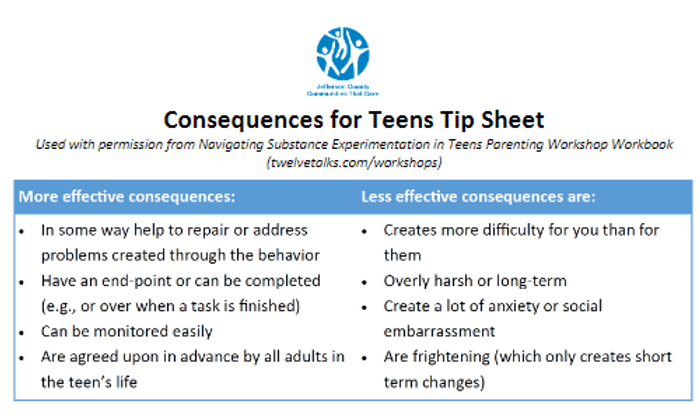Boundaries
Twelve Talks to
Have With Teens
Boundaries
While testing limits is normal teenage behavior, teenagers are safer and happier when they have clear boundaries and family rules. By setting and agreeing on boundaries together, you create a clear understanding of expected behavior, which can help avoid conflict.
- Setting and adjusting boundaries happens as an ongoing process throughout everyone’s life, especially during adolescence. Boundaries and clear rules create clarity as teens navigate adolescence, which is a time of great change.
- Youth with clear boundaries are happier and safer. A Jefferson County survey indicated that when parents involved teens in important decisions, know where they are and who they are with when they are not home, and have clear rules and expectations, their teens were also:
- Less likely to have experienced depression or engaged in self-harm (cutting, burning)
- Much less likely to misuse alcohol, marijuana, or other drugs
- Much less likely to be the victim of sexual or relationship violence
- More likely to do better in school
- Families may need to discuss boundaries fairly often during the teenage years. As young people grow, boundaries around their behavior need to change. Boundaries may also need to be adjusted if the youth exhibits untrustworthy, dangerous, or otherwise problematic behavior.
- Boundary testing is developmentally normal during teen years. All teens will likely violate some agreed-upon boundaries at some point.

Learn strategies for managing conflict and setting boundaries with your teen. (2:39)


Conversation Starters
-
Work with your teen to find a good time of day to have the discussion. Make sure you have plenty of time, you’re in a good mood and there has not been any recent, severe or unaddressed conflict. Minimize distractions or interruptions. Ideally, have a discussion with the whole family or all people involved present.
-
During the conversation, aim to:
-
Listen and respond to the youth’s concerns.
-
Be clear and precise to ensure that there’s no miscommunication.
-
Negotiate points that you disagree on, but be clear if there is something that is non-negotiable (and explain why).
-
Remind them why you’re establishing boundaries together and reiterate your care and concern for them.
-
Discuss what the consequences will be if the boundaries are not followed. Be clear that they have control over avoiding these consequences.
-
If the conversation is turning into an unproductive argument, take a break and follow-up when things have cooled down a bit. Consider setting a specific time frame for returning to the discussion.
-
Suggest a follow-up talk to cover other things that come up unexpectedly, or that don’t feel resolved.
-
Ask Yourself
- What could I think through prior to discussing boundaries with my teen? If possible, discuss your thoughts with other involved adults to help minimize confusing, unclear or mixed messages for your teen.
-
What are the most important boundaries?
-
What are boundaries around technology, video games and social media use?
-
Which boundaries are negotiable, and which are not?
-
What kind of consequences are we comfortable with? How might they backfire or be difficult to implement? See this tip sheets for more information about effective consequences for teens.
-
When, how, and why do established boundaries change?
-
-
Have you asked your teen what boundaries they would like you, as an adult, to stick to? Some possible boundaries an adult might agree to could include your expectation for their participation in family obligations or events, ways your respect their privacy, your interactions with their teachers/ coaches/ work supervisor/ school, allowing the teen to call a “time out” during conversations, etc. Like the boundaries they agree to follow, it’s important that you stick to boundaries that you agreed to.
-
Have you asked for your teens’ feedback on the process? Young people are less likely to stick to boundaries that have been dictated to them without negotiation.


Rules & Boundaries
- With your teen, write down specific and clear boundaries, and consequences, for specific issues. Some ideas for discussion topics include:
- Letting you know where they are, who they are with and when they will be home
-
-
Having friends over or driving friends in the car
-
Doing chores
-
Attending family obligations or events
-
Dating and sexual activity
-
Using technology, including viewing, sending or receiving explicit content
-
Setting expectations for school, such as attendance, grades or homework
-
Treating family members with respect, including any language/cursing rules
-
Closing and/or locking doors, particularly their bedroom door
-
Using, buying or selling alcohol, vape or other drugs
-
Having a group of friends over, or having a party, without permission
-
Driving and/or using your vehicles, getting parking or traffic tickets and/or following rules for the graduated driver’s license
-
Using firearms, explosives or knives
-
Shoplifting
-
Following school rules, including not skipping class, not cheating or copying (or allowing others to use your work)
-
-
Testing boundaries is normal teenage behavior. When this happens:
-
Remind your teen of the previous discussion and which specific boundaries were agreed upon.
-
Ask them to identify how their behavior did or didn’t live up to their agreements.
-
Cooperatively decide, if possible, on a consequence that fits the behavior, preferably based on your previous conversations about consequences.
-
-
Follow through on consequences.
-
If there are possible/planned reductions in the consequence — perhaps as an incentive — these should be decided beforehand, NOT “sometime later.” For suggestions on effective consequences, go to this Consequences for Teens Tip Sheet.
-
Content adapted from Reachout.com.
Equity & Inclusion
-
Family rules and boundaries vary based on a variety of factors including cultural factors, religious or spiritual belief, life experiences and more. A conversation idea could be talking through how your family experiences and beliefs differ from those your teen sees around them or in the media?
- Talking about use of offensive or discriminatory language, use of requested personal pronouns, political beliefs or religious practices may require a pre-conversation setting out conversation guidelines, such as not interrupting, assuming positive intent, asking questions prior to arguing, or other ways you can all be heard and feel respected.

* Healthy Kids Colorado Survey 2019, Jefferson County data; **Jefferson County CTC Youth Town Hall data 2019, 2020 & 2021.
This resource is maintained with funding from a Coalitions Organizing For Prevention grant from the Colorado Department of Public Health and Environment and a Drug Free Communities Grant from the Centers for Disease Control. The views, policies and opinions expressed are those of the authors and do not necessarily reflect those of the grant providers.












